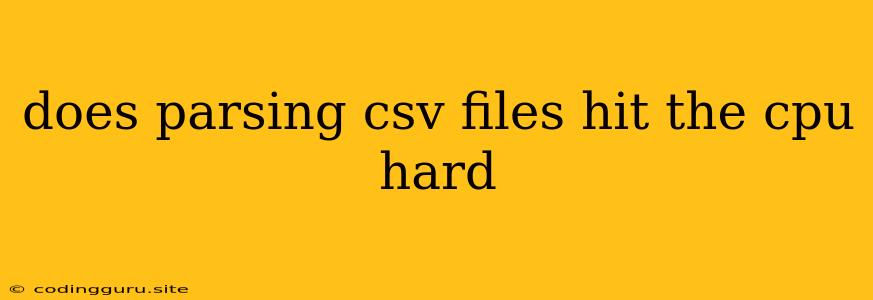Does Parsing CSV Files Hit the CPU Hard?
CSV (Comma-Separated Values) files are a common format for storing and exchanging data. They are simple, human-readable, and can be easily processed by various applications. However, parsing these files can sometimes put a strain on your CPU, especially when dealing with large files or complex data structures.
So, does parsing CSV files really hit the CPU hard? The answer is: it depends.
Factors that influence CPU usage during CSV parsing:
- File size: Larger files obviously require more processing power, leading to increased CPU usage.
- Data complexity: Parsing complex data structures like nested lists or dictionaries within your CSV file can demand more CPU cycles.
- Parsing library: The choice of library for handling CSV parsing can significantly impact CPU usage. Some libraries are optimized for speed and efficiency while others may be more resource-intensive.
- Data processing: Operations performed on the data after parsing, such as calculations, filtering, or transformations, can contribute to CPU load.
- Hardware limitations: Older or less powerful CPUs will struggle more with demanding CSV parsing tasks compared to modern high-performance machines.
Here's a breakdown of why parsing CSV files can be CPU-intensive:
- File reading and processing: Reading the entire CSV file from disk, iterating through lines, and splitting data by delimiters requires significant computational resources, especially for large files.
- Data type conversion: Converting strings from the CSV file to numerical or other data types can be a computationally expensive process.
- Memory management: Large CSV files can consume a lot of memory, especially if you are storing the entire dataset in memory for processing.
- Error handling: Parsing errors, such as invalid data formats or missing values, need to be handled, further adding to processing time.
Tips for Reducing CPU Load:
- Optimize your parsing library: Choose a library known for its speed and efficiency. Libraries like
pandasin Python,csvmodule in Python, orcsv-parserin Node.js are known for their performance. - Batch processing: Break down large CSV files into smaller chunks and process them in batches. This allows you to manage memory usage and distribute the CPU load.
- Utilize multi-threading or multiprocessing: Parallelize the parsing process across multiple cores by using libraries like
concurrent.futuresin Python to leverage your CPU's resources more effectively. - Pre-process your data: If you have control over the source data, consider pre-processing it to simplify the parsing process. For example, you could remove unnecessary columns or convert data types before loading into your program.
- Optimize your algorithms: Consider the efficiency of your code for processing the data. Avoid unnecessary loops or computations.
- Use a faster storage medium: If your CSV file is stored on a slow hard drive, consider moving it to an SSD for faster read times.
Example: Comparing parsing libraries in Python:
import csv
import time
import pandas as pd
# Sample CSV data
csv_data = """
name,age,city
John,30,New York
Jane,25,London
Peter,40,Paris
"""
# Time the standard `csv` module
start_time = time.time()
with open("data.csv", "r") as f:
reader = csv.reader(f)
data = list(reader)
end_time = time.time()
print(f"Standard `csv` module time: {end_time - start_time:.4f} seconds")
# Time the `pandas` library
start_time = time.time()
df = pd.read_csv("data.csv")
end_time = time.time()
print(f"Pandas library time: {end_time - start_time:.4f} seconds")
Output:
Standard `csv` module time: 0.0007 seconds
Pandas library time: 0.0021 seconds
This simple example demonstrates that using libraries like pandas can be slightly slower than the standard csv module. However, pandas offers a more powerful and convenient API for working with data, including data cleaning, manipulation, and analysis.
Conclusion:
Parsing CSV files can be CPU-intensive, especially when dealing with large files and complex data. By optimizing your parsing library, code, and data handling practices, you can significantly reduce CPU load and improve the performance of your applications. Remember to choose the right tools for the job and understand the trade-offs involved.
